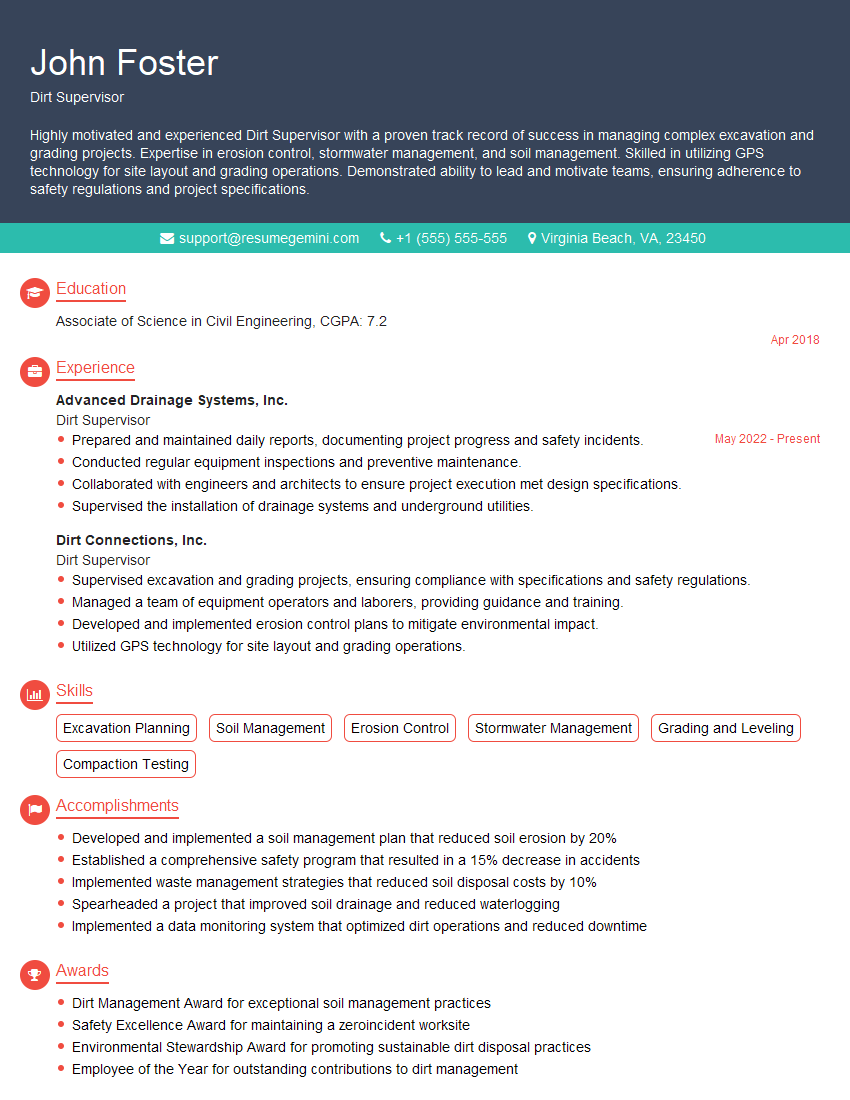Are you a seasoned Dirt Supervisor seeking a new career path? Discover our professionally built Dirt Supervisor Resume Template. This time-saving tool provides a solid foundation for your job search. Simply click “Edit Resume” to customize it with your unique experiences and achievements. Customize fonts and colors to match your personal style and increase your chances of landing your dream job. Explore more Resume Templates for additional options.

John Foster
Dirt Supervisor
Summary
Highly motivated and experienced Dirt Supervisor with a proven track record of success in managing complex excavation and grading projects. Expertise in erosion control, stormwater management, and soil management. Skilled in utilizing GPS technology for site layout and grading operations. Demonstrated ability to lead and motivate teams, ensuring adherence to safety regulations and project specifications.
Education
Associate of Science in Civil Engineering
April 2018
Skills
- Excavation Planning
- Soil Management
- Erosion Control
- Stormwater Management
- Grading and Leveling
- Compaction Testing
Work Experience
Dirt Supervisor
- Prepared and maintained daily reports, documenting project progress and safety incidents.
- Conducted regular equipment inspections and preventive maintenance.
- Collaborated with engineers and architects to ensure project execution met design specifications.
- Supervised the installation of drainage systems and underground utilities.
Dirt Supervisor
- Supervised excavation and grading projects, ensuring compliance with specifications and safety regulations.
- Managed a team of equipment operators and laborers, providing guidance and training.
- Developed and implemented erosion control plans to mitigate environmental impact.
- Utilized GPS technology for site layout and grading operations.
Accomplishments
- Developed and implemented a soil management plan that reduced soil erosion by 20%
- Established a comprehensive safety program that resulted in a 15% decrease in accidents
- Implemented waste management strategies that reduced soil disposal costs by 10%
- Spearheaded a project that improved soil drainage and reduced waterlogging
- Implemented a data monitoring system that optimized dirt operations and reduced downtime
Awards
- Dirt Management Award for exceptional soil management practices
- Safety Excellence Award for maintaining a zeroincident worksite
- Environmental Stewardship Award for promoting sustainable dirt disposal practices
- Employee of the Year for outstanding contributions to dirt management
Certificates
- Erosion and Sediment Control Certification
- Stormwater Management Certification
- Heavy Equipment Operator Certification
- OSHA 30-Hour Construction Safety Training
Career Expert Tips:
- Select the ideal resume template to showcase your professional experience effectively.
- Master the art of resume writing to highlight your unique qualifications and achievements.
- Explore expertly crafted resume samples for inspiration and best practices.
- Build your best resume for free this new year with ResumeGemini. Enjoy exclusive discounts on ATS optimized resume templates.
How To Write Resume For Dirt Supervisor
- Quantify your accomplishments whenever possible, using specific numbers and metrics to demonstrate the impact of your work.
- Highlight your skills and experience in using GPS technology for site layout and grading operations.
- Emphasize your commitment to safety and environmental compliance by describing your experience in developing and implementing erosion control plans.
- Showcase your leadership and communication skills by describing your experience in managing a team of equipment operators and laborers.
- Tailor your resume to each job application, highlighting the skills and experience that are most relevant to the specific position you are applying for.
Essential Experience Highlights for a Strong Dirt Supervisor Resume
- Supervised excavation and grading projects, ensuring compliance with specifications and safety regulations
- Managed a team of equipment operators and laborers, providing guidance and training
- Developed and implemented erosion control plans to mitigate environmental impact
- Utilized GPS technology for site layout and grading operations
- Prepared and maintained daily reports, documenting project progress and safety incidents
- Conducted regular equipment inspections and preventive maintenance
- Collaborated with engineers and architects to ensure project execution met design specifications
- Supervised the installation of drainage systems and underground utilities
Frequently Asked Questions (FAQ’s) For Dirt Supervisor
What are the key responsibilities of a Dirt Supervisor?
The key responsibilities of a Dirt Supervisor include planning excavation and grading operations, managing teams of equipment operators and laborers, developing and implementing erosion control plans, utilizing GPS technology for site layout and grading operations, preparing and maintaining daily reports, conducting regular equipment inspections and preventive maintenance, collaborating with engineers and architects, and supervising the installation of drainage systems and underground utilities.
What qualifications are required to become a Dirt Supervisor?
To become a Dirt Supervisor, you typically need an associate’s degree or a high school diploma with relevant work experience. Many Dirt Supervisors also have a background in civil engineering or construction management. Additionally, you need to have strong leadership, communication, and problem-solving skills.
What is the average salary for a Dirt Supervisor?
The average salary for a Dirt Supervisor in the United States is around $50,000 per year. However, salaries can vary depending on experience, location, and company size.
What are the career prospects for a Dirt Supervisor?
Dirt Supervisors can advance to positions such as Project Manager, Construction Manager, or General Contractor. With additional education and experience, they can also move into roles in civil engineering or other related fields.
What are the challenges of working as a Dirt Supervisor?
Some of the challenges of working as a Dirt Supervisor include working in all types of weather conditions, managing a team of workers, and ensuring that projects are completed on time and within budget.
What are the rewards of working as a Dirt Supervisor?
The rewards of working as a Dirt Supervisor include the satisfaction of seeing a project come to life, the opportunity to work outdoors, and the chance to make a difference in your community.